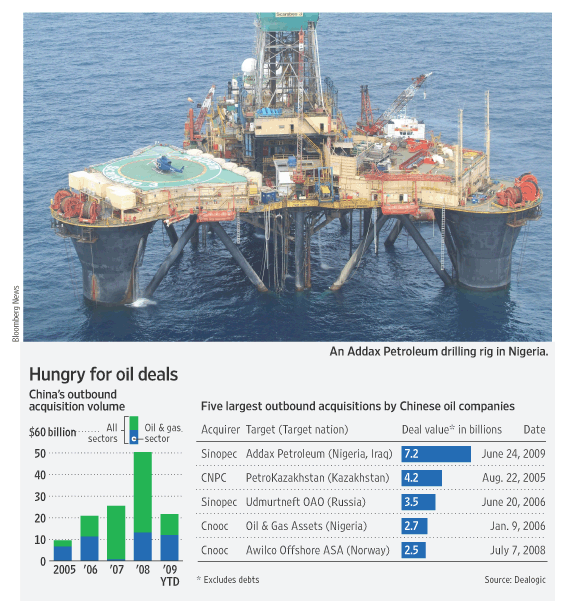Sinopec Gobbles Addax Petroleum
By GUY CHAZAN and SHAI OSTER
China again sought to satisfy its hunger for natural resources, as state-owned Sinopec Group agreed to acquire oil-exploration company Addax Petroleum Corp. for 8.27 billion Canadian dollars (US$7.19 billion), in what would mark the largest overseas takeover by a Chinese company.
The deal increases Sinopec’s presence in one of the world’s hottest oil-exploration frontiers — offshore West Africa — and establishes it in oil-rich but politically sensitive Iraqi Kurdistan.
The transaction also underscores the growing appetite for risk among Chinese resource companies. For years, they tended to tread cautiously, especially after U.S. political pressure forced Cnooc Ltd. to abandon its $18.5 billion bid for oil producer Unocal Corp. in 2005.
But in the past year, Chinese state-owned companies have been encouraged to make acquisitions by a central government convinced that the global financial crisis has created an unmatched buying opportunity.
They are taking advantage of depressed asset prices and access to Chinese credit to strike deals designed to secure the resources needed to power China’s growing economy.
The purchase also demonstrates growing confidence among Chinese energy companies. In the past, they have preferred to strike government-to-government deals and offer loans for oil. Over the past half-year, China has proffered more than $45 billion in loans to Russia, Brazil, Venezuela and Kazakhstan in exchange for long-term crude supplies.
But deals like the Addax acquisition show they are gradually growing into international oil companies, capable of striking high-profile, cross-border deals. They are even expanding into countries, such as Syria, deemed too risky by Western oil companies.

If you enjoy the content at iBankCoin, please follow us on TwitterBut not all of China’s efforts have been successful. In early June, Anglo-Australian mining giant Rio Tinto Ltd. rejected Aluminum Corp. of China’s $19.5 billion offer for part of the company after recovering markets made the deal financially unpalatable. That deal also faced economic, political and shareholder opposition, reflecting fears over the consequences of giving China direct access to big supplies of natural resources.
The Addax deal also marks the first time a global oil giant has ventured into the Kurdish autonomous region of northern Iraq. Authorities in Baghdad have denounced as illegal the roughly 30 oil contracts negotiated between the Kurdish regional government and foreign energy companies like Addax. Western oil majors have steered clear of Kurdistan for fear of antagonizing the Iraqi government.
Sinopec’s foray into the region suggests the tide might be turning. Earlier this year, Iraqi Oil Minister Hussain al-Shahristani gave approval for foreign companies developing oil fields in the Kurdish region to export their crude directly to international markets. Addax was a beneficiary of the change and has been shipping oil since the start of this month.
Still unclear, however, is how foreign companies will be compensated for the oil they export, with most sales revenues being channeled to Baghdad.
“The Sinopec deal shows the big boys are now more confident about investing in Kurdistan,” said Helmut Langanger, head of exploration and production at OMV AG, the Austrian energy firm that is also drilling for oil in the Kurdish region. OMV says its presence in the north disqualified it from participating in Iraq’s first oil-licensing round, scheduled for next week.
“The Chinese must feel comfortable that they can manage this, otherwise they would never have announced it,” said one person familiar with the deal.
Based in Switzerland and listed in London and Toronto, Addax is one of the largest independent oil producers in West Africa and the Middle East by volume. Aside from Kurdistan, it operates off Nigeria, an area that has seen huge exploration success in recent years.
The company produced 136,500 barrels a day on average last year, or about 1.7% of China’s daily consumption. China used about eight million barrels daily last year, according to the BP Statistical Review of World Energy.
The deal is a coup for Addax Chief Executive Jean Claude Gandur, one of the founders and principal shareholders in the company. He is a Swiss citizen who grew up in the Egyptian city of Alexandria and started out as an oil trader in the 1970s.
He set up his own West African trading operation, Addax & Oryx Group, in 1987 and later began acquiring stakes in oil fields while gaining a reputation as a buccaneer who thrived in tough, politically risky settings.
In 1994, he hived off Addax’s oil-exploration and development business into a separate company, Addax Petroleum, and listed it on the Toronto Stock Exchange 12 years later.
Sinopec offered C$52.80 a share, 16% more than Tuesday’s closing price in Toronto. In a statement, Addax said its board recommended that shareholders accept the offer and said senior executives, including Mr. Gandur, have agreed to sell their combined 38% stake to Sinopec.
Sinopec called the acquisition “a transformational transaction” that would accelerate its international growth.


